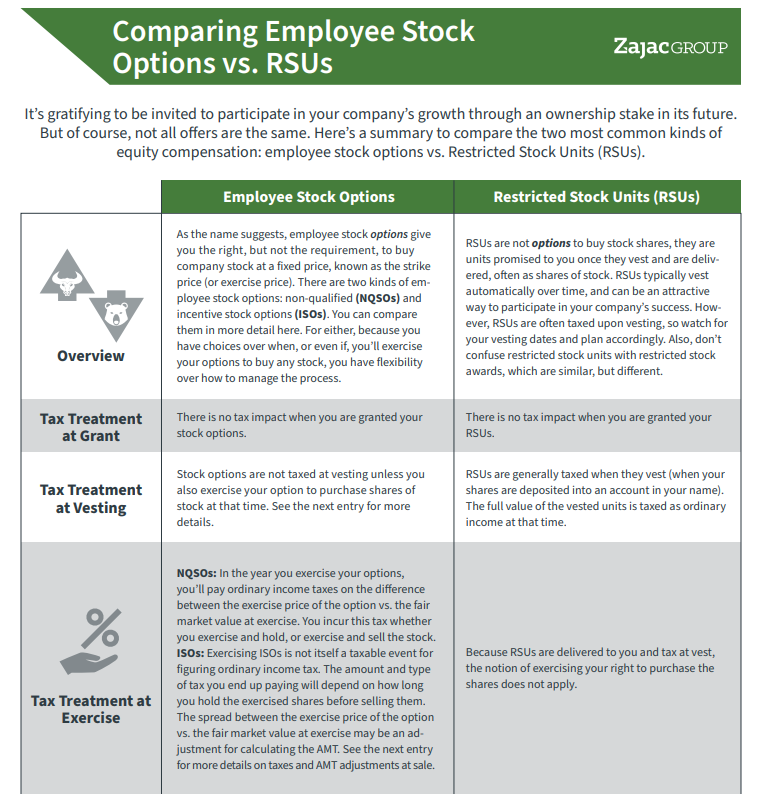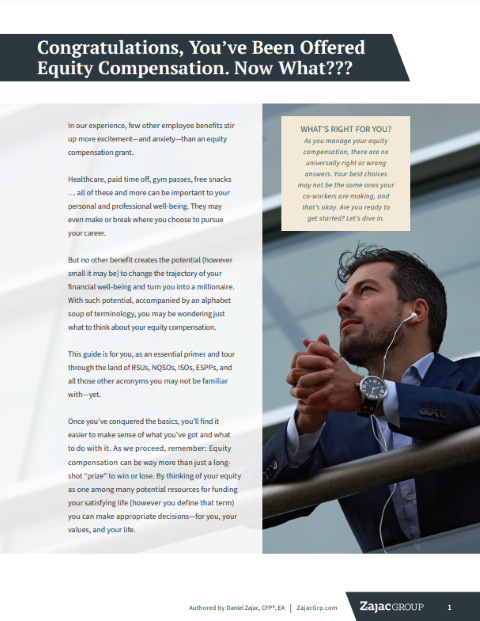
Receiving your RSUs is usually contingent on staying employed with the company for a certain period of time, which is why the units come with a vesting schedule. Before they vest, RSUs are simply a future promise.
Understanding What Happens Immediately After RSUs Vest
Assuming that RSUs vests and are no longer subject to a substantial risk of forfeiture, vesting schedules for RSUs dictate how and when the restricted stock units become the property of the employee.
A vesting schedule might, for example, state that 25% of the RSUs vest each year for 4 years. Once vested, RSUs shift from a future promise to the owned property of the recipient.
This “property” most often comes in shares of company stock, but RSUs may also be paid out via cash compensation. Your plan document should tell you more about exactly how your RSUs are set up.
When RSUs vest, that triggers a taxable event. The value of the vested units will be taxed as ordinary income, subject to both Social Security and Medicare tax.
COMPARISON GUIDE
Not All Stock Offers are the Same! Here's a helpful comparison between two of the most common employee stock options.
Your tax obligation here is commonly handled via an automated share withholding when the shares vest. Your company will withhold the number of shares required to cover the tax cost).
(Keep in mind that the amount of tax that’s withheld is often the statutory withholding requirement — but it might not be enough to cover your actual tax bill. Ensuring you know if you generated enough cash to cover your tax liability when your RSUs vest is one of many reasons to consider working with a financial planner or tax professional with expertise in stock options.)
Once Your Shares Are Yours… Should You Keep or Sell Your Restricted Stock Units?
Once your RSUs vest, they’re yours. You have full ownership rights to the shares that are left after the share withholding has occurred. At this point, you have a decision to make: should you keep your shares, or sell them?
While there may not be a single answer to address every need, we can evaluate the options by exploring the factors that can influence what makes a decision the right one for your situation.
One way to think about restricted stock units is to consider the vested value as compensation income for services rendered. Compensation income is earned income paid to you for successfully doing your job.
If you think about the value of restricted stock units as compensation for your work, their value should logically be the same as what you receive in your weekly, bi-weekly, or monthly paycheck. And in fact, RSUs are taxed the same as your regular paycheck, too.
The major difference is how each type of compensation is paid out to you. Your paycheck is given to you as cash that gets deposited into your bank account. That’s money you can use to pay bills, save, or spend.
Vested restricted stock units paid as shares, however, is company stock… meaning the value is tied to stock and not available until you sell shares.
Know the Taxability of RSUs to Help You Decide What to Do Once Your Units Vest
Assuming you are not in a lock-up or blackout period (or facing any other restrictions), you may be able to sell the shares you received from your RSUs right away. Doing so allows you to convert the value of company stock into cash, just like your paycheck.
To better understand the right time to sell your restricted stock units, let’s explore how your RSUs are taxed when they vest and when you sell the shares:
- Your RSUs vest and their value is reported as ordinary income
- When your RSUs vest, the full value of the vested units is taxed as ordinary income and reported on your year-end W-2.
-
- Income tax is often withheld at a statutory rate (22% in 2022 for amounts under $1,000,000), and other withholdings are made for payroll and other taxes. Your company will usually retain a certain number of units equal to the value of the tax liability to manage that withholding.
-
- The after-tax value of the vested units is then deposited into a brokerage account as shares of company stock (assuming the units settle as shares). The cost basis of the owned shares is equal to the fair market value per share on the vesting date (the amount taxed as ordinary income), and your purchase date of the stock is the date the shares vest.
- You Sell Your Company Stock in the Brokerage Account
-
- If you sell your shares, you report a capital gain or loss. The proceeds of the sale are deposited into your brokerage account, and the transaction is reported on a 1099-B tax statement at the end of the year.
If you sell your RSU shares immediately after they are deposited into your brokerage account, the tax impact of a sale will likely be minimal.
For example, let’s assume that your shares are deposited and have a cost basis equal to the vesting date FMV or $50 per share. Let’s also assume that you sell the shares right away when the FMV is still $50 per share.
This is a reportable tax event, but since the gain is $0 (your cost basis equals the sale price), you don’t owe additional taxes when you sell your restricted stock units.
Why You Might Want to Sell Your Restricted Stock Unit Shares Right Away
As you can see, it is possible that you experience no tax impact on selling shares. This is a good reason to consider selling right away, and transferring the paper value of the shares into actual cash you can use.
The next factor to consider when determining the best time to sell is whether you even want to own company stock. If you accept the suggestion that your RSUs are compensation income for services rendered, why not take that compensation as cash?
To illustrate this, let’s consider the following question: If I offered to give you tens of thousands of dollars in cash right now, would you use that money and go buy company stock? Or would you use it for another need?
If you’d take the cash, that’s a very good reason to consider selling your shares immediately to turn a paper value into actual cash you can use.
Using hypothetical numbers to illustrate the impact of this question, let’s assume that you have the following shares of vesting RSUs.
- RSUs Vesting: 1,000
- FMV of Stock: $50
- RSU Value: $50,000
If we assume that the value will be settled in shares after a 22% statutory withholding (we’ll assume there are no other taxes withheld to simplify the example), the value to be received after tax is:
- Value of Vested Units: $50,000
- Tax Withholding: $50,000 x 22% = $11,000
- After-Tax Value: $39,000
- Shares Deposited: 780
In this example, you will receive 780 shares of stock. So again: if I were to give you a check for $39,000, how much of that money would you use to buy 780 shares of company stock?
If the answer is none of it, it may make a strong argument to sell your RSUs right away.
Integrating Restricted Stock Units and Other Equity Compensation
If you have restricted stock units, it is possible that you have other types of equity compensation too. If you do, it may make for a more complicated situation when evaluating what of your various shares to sell.
Each type of equity compensation (incentive stock options, non-qualified stock options, employee stock purchase plan) has its own rules for when you may be able to do certain things, and what the tax impact of your decisions may be.
While beyond the scope of this article, it’s safe to assume that a more detailed analysis should be integrated into your financial plan if you have more than one type of equity compensation because of the differences in taxability.
What to Do Now with Your Restricted Stock Units
If you have restricted stock units, pay attention to when the shares vest, what the value is, and how you receive that value (i.e. as cash or as company shares of stock). If you receive the value as shares of stock, you need to determine what’s in your best interest: keeping them or selling the shares.
If you think you’d rather sell the shares and use the proceeds for other needs, it’s probably a no-brainer. Consider selling your shares immediately. The shares have already been taxed and you can sell them quickly with little to no tax impact (assuming the current price is near the vested price).
Furthermore, the immediate sale of restricted stock units can also help you diversify from single stock risk or an over-concentrated position on company stock. This is an important consideration for anyone who wants to reduce risk in their investment portfolio.
But as with every question in financial planning, there’s no one-size-fits-all answer. Make sure you fully evaluate your personal situation, your goals and objectives, and your willingness to take investment risk prior to implementing any decision to buy or sell shares of company stock you acquired after your RSUs vested.
This material is intended for informational/educational purposes only and should not be construed as investment, tax, or legal advice, a solicitation, or a recommendation to buy or sell any security or investment product. Hypothetical examples contained herein are for illustrative purposes only and do not reflect, nor attempt to predict, actual results of any investment. The information contained herein is taken from sources believed to be reliable, however accuracy or completeness cannot be guaranteed. Please contact your financial, tax, and legal professionals for more information specific to your situation. Investments are subject to risk, including the loss of principal. Because investment return and principal value fluctuate, shares may be worth more or less than their original value. Some investments are not suitable for all investors, and there is no guarantee that any investing goal will be met. Past performance is no guarantee of future results. Talk to your financial advisor before making any investing decisions.







I had a situation where someone retired with three unvested tranches of RSUs – at which point all three tranches vested (and became taxable in the year of retirement). However, we are told even though they vested they were still “restricted” until original vest date (2020, 2021, 2022). Have you ever heard of this? Doesn’t seem right.
Hi – It may be possible. It sounds like you may be running into a scenario that deals with accelerating units. In this scenario, its possible that there is no longer a substantial right of forfeiture, but the units have not met the vesting requirements. It’s a pretty nuanced area that goes beyond the scope of this conversation. I’d suggest doing some additional research/analysis to see how it may impact a personal situation
Daniel,
If you have a fairly large amount of vested RSUs would you recommend dividing them a bit to lessen the compensation tax and cap gain hit in the current tax year? I guess the risk is that the share price could drop OR you are only postponing the inevitable when you do sell. Just curious to know your thoughts.
Hi John
Not sure you can control the compensation income with RSUs, as they will typically be taxed as compensation income in the year they vest.
What you do after that, either keep the shares or sell them is typically more in your control and will likely impact capital gain/loss
What you do, and when, and with what shares is a personal decision that often goes beyond only tax, and includes investment risk, financial planning, cash flow management, etc. If you want to know more about that, I’d suggest you connect directly
Dan – I want to understand tax implications on my restricted stock units. I put cash in my brokerage to cover the vesting (first 2 of 14 rsu) and tax at my November anniversary as directed my by company plan. Will the value of those shares that I will own in November at vesting, be taxable income for 2020? My plan is to hold and keep the shares invested for many years into future, so when I potentially sell for example 20 years from now, will I also be responsible for tax on the capital gain in 2040?
generally speaking – the value of RSUs at vesting is taxable in the calendar year they vest. The cost basis of shares held post-vesting is often equal to the vested price per share claimed as ordinary income in the year of vest. Future gain/loss will likely be calculated from the basis and subject to capital asset treatment (short term/long term).
Not tax advice – check with your CPA to figure your figures!
So it’s tax time again and I’ve got RSU’s vesting soon. I want to be ready for 2021 since this is the first time I’ve had this type of compensation. I like the idea of selling immediately….. I’d like to take those proceeds and max out my 401(k) and also contribute to a Roth IRA if possible. Here’s the scenario. Let’s say I will net out $30,000 (after stock surrender for tax purposes). My salary might be around $125,000 and I’ll sell the RSUs netting $30,000. I contribute $18,000 to my 401(k) and I’m 60 so I can add another $6,500 for makeup. I’ve never maxed out before and I have not used any makeup ability to date. So, can I max out the 401(k) with $1,500, make up for 2021 with $6,500 and put $7 in my Roth? Do I ALSO have the ability to make up for past years since I have around $15,000-sh left over. Does this help me make the most tax advantaged decision available along this route? I have been playing the scenario over in my head and need a second set of eyes on it (or third….).
Oops. That should be $7,000 in Roth…..
This was the most clear and helpful information I have found on RSUs. Thank you very much!
Great! Glad to hear it is helpful.